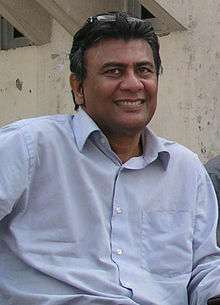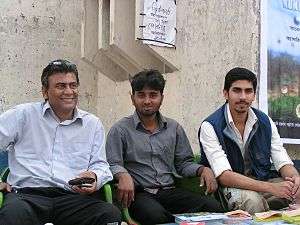Tareque Masud
| Tareque Masud | |
|---|---|
 Masud in Sylhet in December 2010 | |
| Native name | তারেক মাসুদ |
| Born |
6 December 1956 Bhanga, Faridpur, East Pakistan, Pakistan |
| Died |
13 August 2011 (aged 54) Ghior Upazila, Manikganj, Bangladesh |
| Cause of death | Road accident |
| Resting place | Nurpur, Bhanga, Faridpur |
| Nationality | Bangladeshi |
| Alma mater | University of Dhaka |
| Occupation | Film director, producer, screenwriter, lyricist[1] |
| Years active | 1995–2011 |
| Notable work | Muktir Gaan, Matir Moina, Ontarjatra |
| Spouse(s) | Catherine Masud |
| Children | 1 |
| Awards | full list |
| Website |
tarequemasud |
| Signature | |
|
| |
Tareque Masud (6 December 1956 – 13 August 2011)[2] was a Bangladeshi independent film director, film producer, screenwriter and lyricist. He first found success with the films Muktir Gaan (1995)[3] and Matir Moina (2002),[4] for which he won three international awards, including the International Critics' FIPRESCI Prize, in the Directors' Fortnight section outside competition at the 2002 Cannes Film Festival.[5] The film became Bangladesh's first film to compete for the Academy Award for Best Foreign Language Film.
Masud died in a road accident on 13 August 2011 while returning to Dhaka from Manikganj on the Dhaka-Aricha highway after visiting a filming location.[6] Masud was working on Kagojer Phool (The Paper Flower).[7][8] In 2012, he posthumously received Ekushey Padak, the highest civilian award of Bangladesh.[9] In 2013, New York University Asian/Pacific/American Institute, and South Asia Solidarity Initiative, hosted the first North American retrospective of his films.[10]
Background
Masud was born in Nurpur village, Bhanga Upazila, Faridpur District, East Pakistan in 1956. Masud grew up in Nurpur village. He started his education in an Islamic madrasah. He studied in the madrassa system for eight years, till the upheaval brought about by the 9-month Liberation War interrupted his education. After the war, he entered general education, completing his HSC from Notre Dame College and completed his master's degree in History from the University of Dhaka.
Tareque was involved in the film society movement from his university days and started his first film, Adam Surat (The Inner Strength), a documentary on the Bangladeshi painter SM Sultan, in 1982. His 1995 feature-length documentary on the 1971 Liberation War, Muktir Gaan (Song of Freedom), brought record audiences and became a cult classic. He also made many other films on the war, including Muktir Kotha (Words of Freedom, 1999), Narir Kotha (Women and War, 2000) and Naroshundor (The Barbershop, 2009). In 2002, he completed his feature film Matir Moina (The Clay Bird), which was based on his childhood experience in the madrassa.
As a part of his filmmaking work, he was a pioneer of the independent film movement in Bangladesh. In 1986, Tareque was a founding member of Bangladesh Short Film Forum, the leading platform for independent filmmakers in Bangladesh. In 1988, he organized the country's first International Short and Documentary Film Festival, which is held on a biannual basis to this day. He was also known as the "Cinema Feriwalla" for the way in which he showed his films, touring remote towns and villages throughout the country with his mobile projection unit.[11]
His wife, American-born film editor Catherine Masud, was his creative partner. They met at the time he was completing work on Adam Surat and spent the next two decades making films together through their production house Audiovision. Together they wrote scripts, often co-directed, and toured the country and the world with their films. Catherine also edited all of their work.[11]
Early career
Masud's first film was the documentary Adam Surat (Inner Strength) on the Bangladeshi painter SM Sultan which he completed in 1989. His most famous film in early age of his career was the documentary Muktir Gaan (The Song of Freedom, 1995) where camera follows a music troupe during the Liberation War of Bangladesh in 1971. The members of the troupe sing songs to inspire freedom fighters.
His first full-length feature film, Matir Moina ("The Clay Bird", 2002) which debuted at the Cannes Film Festival, derives inspiration from his own childhood experiences. He won the International Critic's Award at the Cannes Film Festival in 2002 for this film,[5] as well as the FIPRESCI Prize for Directors' Fortnight for "its authentic, moving and delicate portrayal of a country struggling for its democratic rights."[12] Matir Moina was received with critical praise and toured the international circuit. It was one of the first Bangladeshi films to be widely circulated and was greeted with enthusiasm for its realistic depiction of life without the melodrama that is prevalent in many other South Asian films.
His film, Ontarjatra ("Homeland", 2006), featured two generations of Bangladeshi diaspora in London and their return to Bangladesh. His next feature film, Runway (2010) was about the influence of radical religious teachings on a young boy, caught between many modernistic. Masud's last unfinished project was Kagojer Phool ("The Paper Flower"), about the partition of the Indian subcontinent. This film has become a prequel to Matir Moina ("The Clay Bird", 2002).
Death
On 13 August 2011, Masud died in a road accident at Joka under Ghior Upazila while returning to Dhaka from Manikganj on the Dhaka-Aricha highway after visiting a shooting location.[13] His microbus collided head-on with an oncoming passenger bus.[6] He along with the other passengers were traveling to choose shooting locations for his new film Kagojer Phool (The Paper Flower), filming of which was supposed to begin after shooting locations were elected.[7]
Masud was traveling with long-time co-worker Mishuk Munier, a cinematographer, a journalist and CEO of ATN News. Munier also died in the accident.[13]
Masud's wife, Catherine, along with four others, survived the accident. Since his death, Catherine has established the Tareque Masud Memorial Trust, which is dedicated to the task of archiving and memorializing Masud's work through publications, educational projects, screening programs, and the completion of their unfinished works.[11]
Awards
Masud was received many international and national awards for his notable works. He received Best Film Award from Bengal Film Journalists' Association Awards in 1996 and a Special Jury Prize from Festival of South Asian Documentaries in 1997 and a National Award for Documentary film Muktir Gaan.
He received an International Critics' FIPRESCI Prize, in the Directors' Fortnight section outside competition at the 2002 Cannes Film Festival.[5] Best Screenplay Award from International Film Festival of Marrakech in 2002. Best Film Award from Bengal Film Journalists' Association Awards, Kara Film Festival and Channel I Film Awards in 2003 from the film Matir Moina (2002).
After Masud received Jury Prize from International Video Festival of India in 2003, Best Direction award from International Film Festival Bangladesh in 2006, Special Jury Award, Osian's Cinefan Festival Delhi in 2006, Meril Prothom Alo Awards in 2010 etc.
In 2012, he received Ekushey Padak, the highest civilian award of Bangladesh posthumously.[9] In 2013, New York University Asian/Pacific/American Institute, and South Asia Solidarity Initiative, hosted the first North American retrospective of his films.[10]
